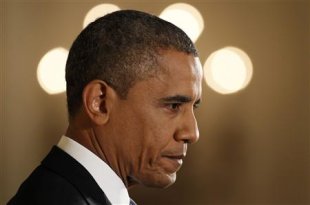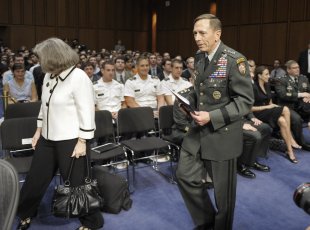 President Barack Obama speaks at his first news conference since his reelection. (Kevin Lamarque/Reuters)President Barack Obama bluntly told John McCain and other Republicans to lay off their attacks against U.N. Ambassador Susan Rice over the Benghazi assault, telling lawmakers that if they go after her "then you have a problem with me." And Obama, speaking at his first post-election press conference, vowed that Republican opposition would not dissuade him from nominating Rice to replace departing Secretary of State Hillary Clinton.
President Barack Obama speaks at his first news conference since his reelection. (Kevin Lamarque/Reuters)President Barack Obama bluntly told John McCain and other Republicans to lay off their attacks against U.N. Ambassador Susan Rice over the Benghazi assault, telling lawmakers that if they go after her "then you have a problem with me." And Obama, speaking at his first post-election press conference, vowed that Republican opposition would not dissuade him from nominating Rice to replace departing Secretary of State Hillary Clinton.
"I don't think there's any debate in this country that when you have four Americans killed that's a problem," he told reporters in the East Room of the White House. "And we've go to get to the bottom of it, and there needs to be accountability, we've got to bring those who carried it out to justice --they won't get any debate from me on that."
"But when they go after the U.N. ambassador, apparently because they think she's an easy target, then they've got a problem with me," he warned.
McCain, Senator Lindsey Graham of South Carolina, and some other Republicans have signaled they will oppose Rice's confirmation if Obama nominates her. Their numbers thus far seem far short of the 40 needed to block it, and some Republican senators have signaled that she should get a fair hearing.
"Let me say specifically about Susan Rice: She has done exemplary work. She has represented the United States and our interests in the United Nations with skill, and professionalism, and toughness, and grace," Obama said.
"And should I choose, if I think that she would be the best person to serve America in the capacity of the State Department, then I will nominate her," he vowed. "That's not a determination that I've made yet."
Rice and Democratic Senator John Kerry, who chairs the Senate Foreign Relations Committee, are seen as the front-runners in the race to succeed Clinton.
Conservatives have assailed Rice, who is close to Obama, ever since she made the rounds of the Sunday morning talk shows and said that American intelligence believed that the attack on the American compound in Benghazi, which claimed the lives of U.S. Ambassador Chris Stevens and three other Americans, grew out of demonstrations against an Internet video that ridicules Islam.
"As that unfolded, it seems to have been hijacked, let us say, by some individual clusters of extremists who came with heavier weapons, weapons that, as you know, in the wake of the revolution in Libya are quite common and accessible. And it then evolved from there," she told ABC.
White House aides have said that Rice was speaking based on the best available intelligence at the time.
"She made an appearance at the request of the White House in which she gave her best understanding of the intelligence provided to her," Obama said Wednesday. "If Senator McCain and Senator Graham want to go after somebody, they should go after me."
"But for them to go after the U.N. ambassador, who had nothing to do with Benghazi, and was simply making a presentation based on intelligence that she had received, and to besmirch her reputation is outrageous," he said.
"We're after an election now," he scolded. "I think it is important for us to find out exactly what happened in Benghazi, and I'm happy to cooperate in any ways that Congress wants. We have provided every bit of information that we have and we will continue to provide information and we've got a full-blown investigation. And all that information will be disgorged to Congress."
McCain and Graham hit back quickly.
"I have always said that the buck stops with the President of the United States," the Arizona senator said in a written statement. McCain accused Obama of "contradictory statements" about the attack, labeling it an "act of terror" the day after it happened then resisting the use of the word "terrorism" for roughly a week afterwards.
"We owe the American people and the families of the murdered Americans a full and complete explanation, which for two months the President has failed to deliver," said McCain, who has called for Congress to create a "select committee" to investigate.
"Mr. President, don't think for one minute I don't hold you ultimately responsible for Benghazi. I think you failed as commander in chief before, during and after the attack," Graham said in a statement released by his office.
"We owe it to the American people and the victims of this attack to have full, fair hearings and accountability be assigned where appropriate. Given what I know now, I have no intention of promoting anyone who is up to their eyeballs in the Benghazi debacle," Graham said.
Obama opened what was his first press conference in months with a vow to work with both parties in Congress to tackle the so-called fiscal cliff and revive the economy. He also said he had "no evidence" that the scandal that led David Petraeus to resign in disgrace from his job as CIA director had led to breaches in classified national security material.
"Right now our economy is still recovering from a very deep and damaging crisis, so our top priority has to be jobs and growth," Obama said in opening remarks in the East Room of the White House.
"Both parties can work together" to address the fiscal challenges "in a balanced and responsible way," he said, before pushing Republicans to sign on to his call for raising taxes on the richest Americans.
Asked whether the scandal the drove Petraeus from office had led to national security breaches, Obama replied: "I have no evidence at this point, from what I've seen, that classified information was disclosed that in any way would have had a negative impact on our national security." And the president praised the retired general, saying "we are safer because of the work Dave Petraeus has done."
Asked for his appraisal of the FBI's work in bringing to light the marital infidelity that Petraeus cited in his resignation message, and why he and the American public learned of the probe only earlier this month, Obama said "I am withholding judgment" on that process but expressed "a lot of confidence generally in the FBI."
Turning to his tax battle with Republicans, Obama stuck by his vow to oppose any legislation that extends the Bush-era tax cuts for the wealthiest 2 percent of Americans. The president, asked why he had agreed to extend them in the 2010 lame duck session of Congress, said that "was a one-time proposition" and that "we cannot afford" to do so again.
Obama said he would be willing to look at raising tax revenues by closing loopholes. But he warned that doing so would probably not outweigh an estimated trillion dollars lost by extending tax cuts on income above $250,000. "The math tends not to work," he said.
"I just want to emphasize: I am open to new ideas," Obama underlined. "If the Republican counterparts or some Democrats have a great idea for us to raise revenue, maintain progressivity, make sure the middle class isn't getting hit, reduces our deficit, encourages growth, I'm not going to just slam the door in their face. I want to hear ideas from everybody."
And he reiterated that he does not want just a stopgap agreement with Congress.
"I want a big deal, I want a comprehensive deal," he said. "Fair-minded people can come to an agreement."
Obama, who won the Latino vote by a lopsided margin, also vowed to pursue comprehensive immigration reform in his second term. He said it should include border enforcement, penalties for companies that knowingly hire undocumented workers, while providing "a pathway for legal status" for those who pay their taxes and learn English. He also said it should lock in his presidential determination that undocumented immigrants brought here as children should not be deported but have a potential path to citizenship.
"We need to seize the moment," he said, predicting that "we will have a bill introduced and we begin the process in Congress very soon after my inauguration."
Obama addressed a handful of other issues:
- On the standoff over Iran's suspect nuclear program
Obama pledged to "try to make a push in the coming months to see if we can open up a dialogue between Iran and not just us but the international community, to see if we can get this thing resolved." "I can't promise that Iran will walk through the door that they need to walk though, but that would be very much the preferable option" to military action, he said.
- On the possibility of working with Republican rival Mitt Romney
Obama said that "we haven't scheduled something yet." "I think everybody needs to catch their breath. I'm sure that Governor Romney is spending some time with his family. And my hope is, before the end of the year, though, that we have a chance to sit down and talk," the president said.
- On whether he has a mandate
"I don't presume that because I won an election, that everybody suddenly agrees with me on any — everything. I'm more than familiar with all the literature about presidential overreach in second terms," Obama said. "We are very cautious about that."
"On the other hand, I didn't get re-elected just to bask in re- election. I got elected to do work on behalf of American families and small businesses all across the country who are still recovering from a really bad recession but are hopeful about the future. And I am, too."
- On climate change
Obama said he would embark "over the next several weeks, next several months" in a "wide-ranging discussion" with scientists, engineers, elected officials and others about "short-term" steps in reducing carbon emissions blamed for fueling global warming. But he seemed pessimistic about any broad response.
"I don't know what either Democrats or Republicans are prepared to do," he said. "There's no doubt that for us to take on climate change in a serious way would involve making some tough political choices."
"And you know, understandably, I think the American people right now have been so focused and will continue to be focused on our economy and jobs and growth that, you know, if the message is somehow we're going to ignore jobs and growth simply to address climate change, I don't think anybody's going to go for that. I won't go for that."
- On relations with the media. Bloomberg reporter Hans Nichols shouted out a question about taxes after Obama had indicated that he had already taken his final query.
"That was a great question, but it would be a horrible precedent for me to answer your question just because you yelled it out," he said. "So thank you very much, guys."












